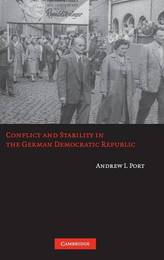
|
Conflict and Stability in the German Democratic Republic
Hardback
Main Details
Description
Why did the German Democratic Republic last for so long - longer, in fact, than the Weimar Republic and the Third Reich combined? This book looks at various political, social, and economic conflicts at the grass roots of the GDR in an attempt to answer this question and account for regime stability. A local study, it examines opposition and discontent in Saalfeld, an important industrial and agricultural district. Based on previously inaccessible primary sources as well as on interviews with local residents, the book offers a novel explanation for the durability of the regime by looking at how authorities tried to achieve harmony and consensus through negotiation and compromise. At the same time, it shows how official policies created deep-seated social cleavages that promoted stability by hindering East Germans from presenting a united front to authorities when mounting opposition or pressing for change. All of this provides an indirect answer to perhaps the major question of the postwar period: Why did the Cold War last as long as it did?
Author Biography
Andrew I. Port is an assistant professor of history at Wayne State University in Detroit. He earned a Ph.D. in history from Harvard University and a B.A. in history from Yale University. He has published articles in Social History and the Frankfurter Allgemeine Zeitung. Professor Port is a research associate at the Center for Russian and East European Studies at the University of Michigan in Ann Arbor, and he was a visiting scholar at the Zentrum fur Zeithistorische Forschung (Center for Contemporary Historical Research) in Potsdam, Germany.
Reviews"Andrew Port's exquisitely written history of the East German southern industrial town of Saalfeld in the Ulbricht era, based on a dizzying array of sources from fifteen German archives, is the latest in a series of books on the German Democratic Republic that seek to explain the relative stability of the regime...Port's nuanced argument on the nature of rule in East Germany presented in this meticulous, elegant work should be taken into account in all future work on the GDR." - H-German, Gary Bruce, Department of History, University of Waterloo "...Andrew Port has written a pathbreaking work without which no valid judgement can be made in the future about the social development of the GDR." -Gerhard Wettig, Deutschland Archiv "This fully researched, richly documented, and well-written study is a welcome addition to understanding grassroots East German history. Summing Up: Highly recommended." Choice "...Port's book makes a vital, original, and possibly even pathbreaking contribution to GDR scholarship. It deserves a wide readership." -Bill Niven, Central European History "...exquisitely written history... " -Gary Bruce, H-German "...original insights... innovative achievement... not only debunks the enduring legend of the East German _Notgemeinschaft_ ('community created by necessity'), but also provides an additional explantion for the, at first glance, puzzling stability of the GDR" Hermann Wentker (Director, Institut fuer Zeitgeschichte, Munich/Berlin)in Sehepunkte
|